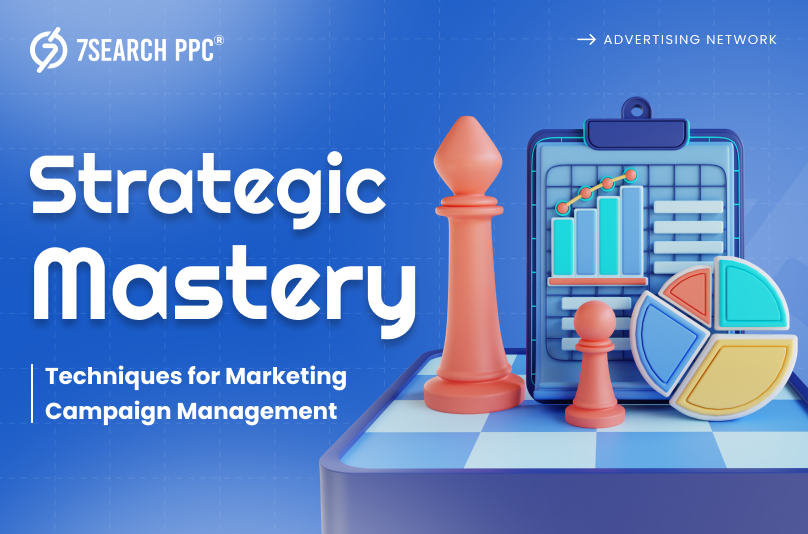“Nike,” a market leader in athletic footwear and apparel. Some of you might use their product for daily workouts and find it essential for your active lifestyle. This sports brand earns billions annually just because of effective marketing campaign management. They produced some of the most iconic marketing campaigns in history, from “Just Do It” to “Equality.”
Online marketing is not just for survival. It has become a necessity for marketers. Every click, impression, and conversion decides the battle that you are going to win or lose. To emerge victorious, you need more than just a strategy. You need to be a strategic mastermind, a campaign architect who can orchestrate every element to perfection. This is where the art and science of campaign management truly work.
In this blog, we’ll explore the strategies that can lift your campaigns from ordinary to extraordinary.
Marketing Campaign Management: The Blueprint for Success
Running a marketing campaign means carrying out a plan to achieve specific business goals through targeted promotional activities, and managing all such things comes under marketing campaign management. This involves:
- Setting clear objectives,
- Creating content,
- Choosing the right channels,
- Checking the real position of your marketing efforts.
The aim is to make sure all parts of the campaign fit together well and work effectively. By keeping an eye on progress and adjusting as needed, businesses can improve their strategies, connect with their target audience, and get the best possible results. Ultimately, the goal is to integrate efforts to make the campaign successful and meet its goal.
Key Components of Effective Marketing Campaign Management
Digital campaign management involves a strategic process of planning, executing, and evaluating marketing efforts to achieve specific goals. The entire marketing strategy relies on four key pillars:
Message
The message is the core idea or value proposition you want to communicate to your target audience. It is the heart of your campaign. It builds a strong connection with your ideal audience, which is the primary goal of your marketing campaign. You can not generate a message for your advertising campaign without having a deep understanding of the market.
A compelling message resonates with your audience, addressing their needs, desires, or pain points. It should be clear, concise, and memorable, effectively conveying your brand’s unique selling point.
Market
Understanding your target market is a very important pillar in marketing campaign management. This means making a detailed profile of your ideal customer, including their:
- Age, Gender, Location
- Interests, Value, Lifestyles
- Buying Habits, Online Activity
By thoroughly understanding your market, you can adjust your messaging to better fit their specific needs and desires. This knowledge also helps you select the most effective channels to reach your audience. This pillar ensures your marketing efforts are focused and impactful.
Media
The next pillar of marketing campaign management is “Media.” Media channels are the platforms used to deliver your marketing message to your target audience. They can include digital forms like social media, email, websites, and search engines. It also includes traditional options such as radio, television, and print.
Choosing the right mix of media channels is essential for the success of your campaign. This involves taking into account factors such as the:
- Media consumption habits of your target audience,
- Your campaign goals,
- Your budget.
By strategically combining different media channels, you can maximize your reach, frequency, and impact, ensuring that your message resonates with the right people at the right time.
Moment
Campaign management is the process that begins before the campaign launch and continues until you achieve your marketing goal. During this journey, timing plays a crucial role in marketing success. That’s why we consider it a strong pillar of marketing campaign management.
The ‘moment’ refers to the optimal time to launch or execute a campaign. It involves carefully considering factors such as:
- Seasonal Trends
- Holidays
- News
- Events
- Competitor Activities.
By matching your campaign with relevant moments, you can maximize its impact. To understand this pillar better, let’s take an example: a summer-themed campaign during winter is unlikely to work. Effective marketers identify these opportune moments to capture audience attention, increase engagement, and drive desired outcomes.
The Significance of Marketing Campaign Management
Managing marketing campaigns is really important for a few key reasons:

Maximizes Engagements and Conversions
Marketing campaign management helps in setting clear goals and defining the target audience. By planning strategically, businesses can align their marketing efforts with their overall objectives. It ensures that every campaign is designed to meet specific goals. This involves:
- Researching the market
- Understanding consumer behavior
- Creating a detailed plan of action
Good planning helps use resources wisely and makes sure the marketing message reaches the right people. This results in more audience engagement and a higher rate of conversions.
Controls Your Marketing Budget
Your marketing budget is like fuel for your marketing campaign, as it decides how long it can run. Effective marketing campaign management allows businesses to use their marketing funds wisely. By monitoring spending and tracking the return on their investments, companies can ensure they are using their money efficiently.
This helps in figuring out which marketing channels and tactics work best so adjustments can be made to avoid wasting money on strategies that don’t perform well. Good budget control helps maximize the impact of marketing efforts while staying within financial limits, leading to better financial health and ongoing market success.
Quick Adjustments for Ongoing Marketing Operations
Marketing campaigns often need to change based on performance data and market shifts. Marketing campaign management allows businesses to easily adjust to new trends, consumer feedback, or unexpected challenges. This way, companies can run their marketing campaign without worrying about the market fluctuations. This flexibility helps companies stay relevant and effective in their marketing journey.
Prevents Repetitive Errors
Errors can occur for anyone at any time. You can not control them, but you can minimize them by applying the right strategies and being proactive in your approach. But what about repetitive errors? Yes, you can control them with the help of marketing campaign management.
Campaign management highlights the errors that occurred during the operation. It provides insight into the nature of the error and the damage it has done to your marketing efforts. Next time the same situation arises, you will already know the impact and be prepared to manage the risk by applying the right strategy to address it.
Secures Your Victory in the Battlefield
No matter how big or small your business is, you need effective marketing for success. Each product needs marketing, from a ring to a needle, for two main reasons: brand awareness and competition. Don’t think that your product is unique or has a low value, so you don’t need marketing campaign management.
It’s a battleground where tough competitors exist for every product. As we already discussed above, campaign management offers flexibility and adaptability to businesses so they can modify their campaigns according to the competition. If they feel that their campaign isn’t delivering the desired results, they can quickly adjust strategies to stay ahead of the competition.
Effective Techniques for Marketing Campaign Management
Effective campaign management is crucial for achieving successful outcomes. Here are some techniques to help manage your ad campaigns effectively:

Define Your Success: Set Clear Goals and KPIs
A successful marketing campaign management starts with a clear purpose. Identify your desired outcome, whether it’s:
- Increasing Sales,
- Boosting Brand Awareness,
- Generating Leads.
Once you know your goal, establish specific, measurable, achievable, relevant, and time-bound KPIs to track campaign progress. Setting clear goals and KPIs gives your campaign a clear direction. It ensures that your team member or business partner knows what the end goal is and the benchmark that you have set for KPIs. This ensures everyone stays focused and works efficiently throughout the campaign.
Take Insights of Your Target Audience
If you want to master marketing campaign management, you must have a deep understanding of your target audience. First, research and then create detailed buyer personas by keeping the following things in mind:
- Needs,
- Preferences,
- Interests,
- Behavior.
By knowing your audience well, you can match your content with them and choose the best channels to reach them personally. This personalized approach helps you build a long-lasting connection with your target audience through marketing. When you directly address your audience’s desires and pain points, they are more likely to connect positively and become loyal customers.
Optimize Your Marketing Reach: Select The Ideal Channels
It is essential to select the most suitable marketing platforms for your campaign. Begin by figuring out where your target audience spends most of their time, whether it’s on websites, social media, or blogs. Take into account factors such as:
- Demographics
- Interests
- Behavior
Research whether your chosen channels match your campaign goals. For instance, PPC ad networks are excellent for brand awareness and programmatic advertising, while email is effective for nurturing leads. By concentrating on the right marketing platforms, you can extend your reach and effectiveness, making sure your message reaches the right audience.
(For better results, we recommend trying omnichannel marketing. While it may require a significant investment, it ensures that if one channel is not delivering the desired results, others can compensate.
Make the Most of Information from Data Analysis
Data is an invaluable asset for achieving success with your campaigns. Use analytics tools to discover important insights about your audience, campaign performance, and competitors. By examining the past and current data, you can:
- Spot Trends
- Improve Your Strategies
- Make well-Informed Decisions
This data-focused method enables you to consistently enhance your campaigns, boosting their impact and keeping you ahead of the competition. Always remember one thing: data is more than just information; it’s a potent tool for growth.
Consistent Reviewing and Refining for Better Results
The field of marketing is constantly changing. We can’t predict every trend, but staying adaptable is key. To keep your campaigns effective, it’s crucial to consistently track and analyze their performance. Setting key performance indicators will be beneficial for your marketing campaign management efforts. It can help you to measure success and pinpoint areas that need improvement.
It is important to keep in mind that the market is dynamic, so being flexible and adapting to changes is important for long-term success. Regular optimization based on data-driven insights will ensure that your marketing campaigns continue to perform at their best level.
Conclusion
Mastering marketing campaign management is crucial for bringing your ideas to life. By comprehensively understanding your target audience, setting clear goals, choosing the right marketing channels, and analyzing data, you can create campaigns that not only capture attention but also drive results.
Successful marketing campaigns are built on a base of strategy, creativity, and continuous optimization. So, embrace the challenge, analyze, adapt, and conquer the digital landscape. Your brand’s success story starts with effective campaign management, so do your best.
Frequently Asked Questions (FAQs)
What is marketing campaign management?
Ans. It is the process of planning, executing, and evaluating marketing efforts to achieve specific marketing goals.
How can I identify my ideal audience better?
Ans. Create detailed buyer personas based on research into your audience’s needs, preferences, interests, and behaviors. This will help you tailor your message and choose the right marketing channels.
What if my marketing campaign is not performing well?
Ans. Don’t panic! Analyze the data to identify the problem areas. Make adjustments to your message, targeting, or channels.
Can I manage my marketing campaigns myself?
Ans. You can, but it requires time, expertise, and the right tools. If you lack resources, consider hiring a professional or using marketing automation software.
What is the role of data in marketing campaign management?
Ans. Data is crucial for making informed decisions. It helps you comprehend your audience, assess performance, spot trends, and enhance your campaigns for improved outcomes.

















